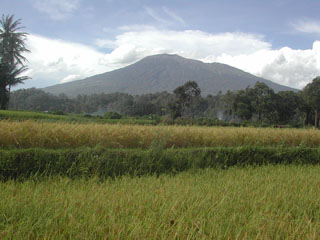Report on Marapi (Indonesia) — 24 January-30 January 2024
Smithsonian Institution / US Geological Survey
Weekly Volcanic Activity Report, 24 January-30 January 2024
Managing Editor: Sally Sennert.
Please cite this report as:
Global Volcanism Program, 2024. Report on Marapi (Indonesia) (Sennert, S, ed.). Weekly Volcanic Activity Report, 24 January-30 January 2024. Smithsonian Institution and US Geological Survey.
Marapi
Indonesia
0.38°S, 100.474°E; summit elev. 2885 m
All times are local (unless otherwise noted)
PVMBG reported that eruptive activity at Marapi (on Sumatra) was ongoing during 24-30 January. White-and-gray ash plumes rose 300 m above the summit and drifted N and NE on 25 January. White gas-and-steam plumes rose 150-250 m above the summit and drifted in multiple directions during 28-30 January. Emissions were not observed on the other days. The Alert Level remained at 3 (on a scale of 1-4), and the public was warned to stay 4.5 km away from the active crater.
Geological Summary. Gunung Marapi, not to be confused with the better-known Merapi volcano on Java, is Sumatra's most active volcano. This massive complex stratovolcano rises 2,000 m above the Bukittinggi Plain in the Padang Highlands. A broad summit contains multiple partially overlapping summit craters constructed within the small 1.4-km-wide Bancah caldera. The summit craters are located along an ENE-WSW line, with volcanism migrating to the west. More than 50 eruptions, typically consisting of small-to-moderate explosive activity, have been recorded since the end of the 18th century; no lava flows outside the summit craters have been reported in historical time.
Source: Pusat Vulkanologi dan Mitigasi Bencana Geologi (PVMBG, also known as CVGHM)

